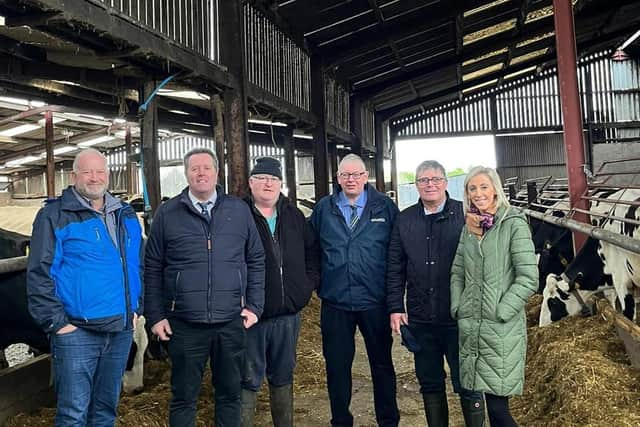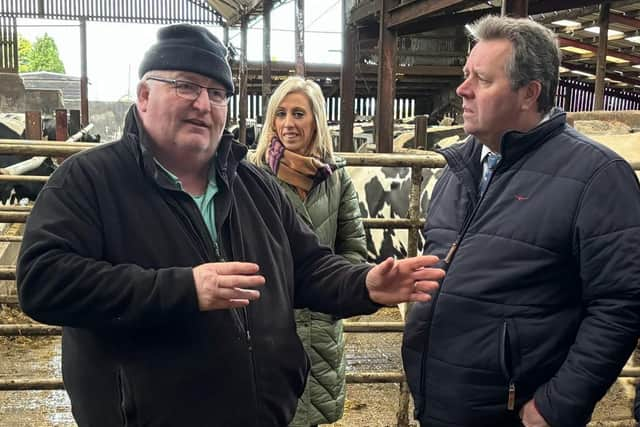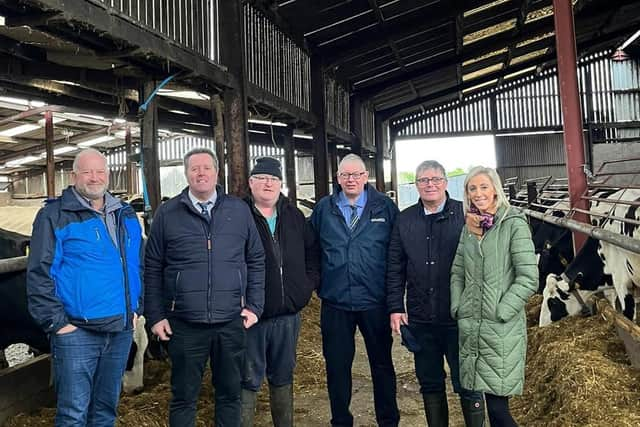DUP’s Carla Lockhart welcomes DEFRA Minister to Northern Ireland
and live on Freeview channel 276
The DEFRA Minister visited Charlie Weir’s Burnhill pedigree dairy herd on the outskirts of Waringstown, and met a delegation from Holstein NI which included its secretary John Martin, and club members Alan Irwin, Benburb and Gary McHenry, Aghalee.
A number of critical issues were discussed, including TB, farm-gate milk prices and BVD.
Advertisement
Advertisement
Carla Lockhart continues to call for progress in tackling TB in 2024. “TB is a pressing issue and is estimated to cost the public purse around £50m per year. In the last five years almost 90,000 bovine animals have been culled as a result of confirmed or suspected TB.


“The situation has been ongoing for decades, and the rising TB rate proves there is a need for urgent action. The disease is having significant impact on family farms and the agri-food economy. As well as causing severe financial pressure on the farm business, a TB outbreak can be mentally challenging for farming families.
“Many farmers, especially pedigree breeders, have lost a lifetime’s work and generations of valuable genetics and bloodlines, due to bovine tuberculosis.”
During the meeting the dairy farming delegation stressed the importance of maintaining a sustainable agricultural sector in Northern Ireland. The incidence of TB remains high across the country, and it’s obvious that the protocols currently in place aren’t doing enough to combat the ongoing issue.
Advertisement
Advertisement
Carla Lockhart recognises the need for change. She urged Mr Spencer to press Stormont’s new Agriculture Minister to continue with the ‘new thinking’ approach to TB taken by former Minister Edwin Poots. “We can’t keep continuing to do the same thing over and over again, and expecting a different result.


“It’s time for a more robust and structured plan to try and control and eradicate this decimating disease. There needs to be a collaborative approach whereby vets and government agencies can work with farmers to bring TB under control.”
Milk prices were also discussed, with the dairy farming delegates highlighting the need for farm-gate milk prices to reflect the increase in overhead costs.
For a prolonged period, milk prices have fell below the cost of production. Farmers have been discouraged and financially burdened by a drop in farm-gate milk prices, while retail prices for milk, butter and other dairy products remain high.
Advertisement
Advertisement
Holstein NI’s spokesman John Martin stressed the need for a fairer distribution of margin to be returned to the processor, which in turn could be shared with the primary producer.


The DEFRA Minister was urged to offer assurance that food imports to the UK would be required to meet the same stringent standards that local farmers are required to adhere to. Existing environmental regulations, and animal health and welfare standards, all add a substantial cost to UK production costs.
Ms Lockhart called for government funding to bolster investment in new technology and plant, both on-farm and at processor level, which would improve sustainability and efficiency within Northern Ireland. “Our close neighbours have continued to invest in facilities with funding provided by their respective governments.”
The conversation with Minister Spencer also focused on BVD. NI farmers have been testing calves for Bovine Viral Diarrhoea (BVD) since the voluntary scheme was introduced more than 10 years ago. BVD testing has been a mandatory requirement since 2016.
Advertisement
Advertisement
Carla Lockhart said: “Livestock farmers, and pedigree breeders in particular, have a limited market for their high-genetic beef and dairy cattle.
“While excellent progress has been made in driving down the incidence of BVD in Northern Ireland, more work is needed to eradicate the disease completely. ROI has successfully demonstrated what needs to be done, and
what can be achieved as a result.
“DAERA officials need to get a handle on BVD eradication so NI farmers aren’t ‘cut off’ and can avail of the growing demand for NI-bred genetics.”